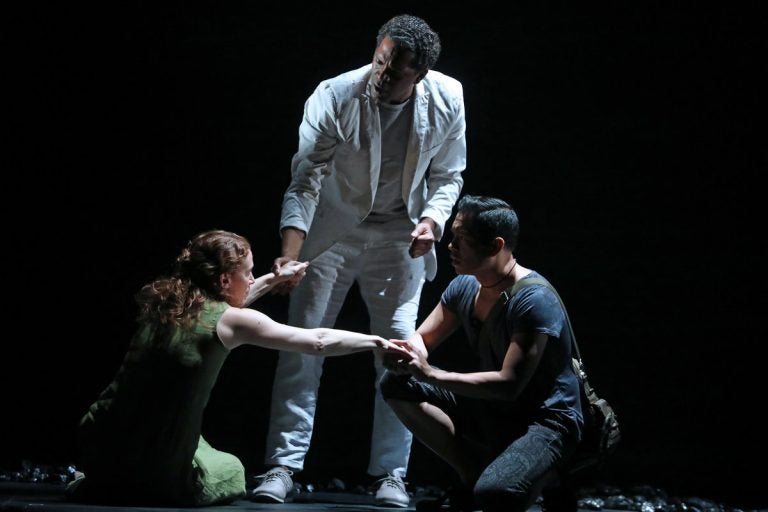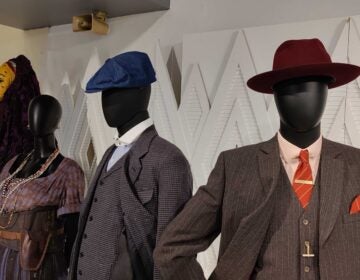A ‘Passage’ with no exit, at Wilma Theater
A new play considers oppressing and being oppressed.

In the Wilma Theater production of "Passage," (from left) Krista Apple, Lindsay Smiling, and Justin Jain. (Bill Hebert)
The new play “Passage” digs deep and then gets stuck. It can’t find its way out, like one of its characters who ends up scared and alone in a labyrinthian cave. He, at least, gets out, into a world that will never be the same for him. We in the audience don’t fare even that well.
Christopher Chen’s play — with more themes than a Disney Park but primarily about being an oppressor vs. being oppressed — begins with a credible plot and turns abruptly toward the end into something resembling a sermon. It feels like we accidentally hit the remote.
Wilma Theater, to be sure, throws itself into this world premiere from the same playwright who wrote the engaging “Caught,” produced a few seasons back by InterAct Theatre. Like the last minutes of “Passage,” that play also had a jarring final scene that forced us to figure out whether we were watching characters or the actors playing them. It worked because either way, it was a part of the play we’d been seeing. Not so in “Passage,” in which a character comes out to talk to us directly, and with a lot of what-ifs about the play. I assume Chen’s addendum prods us to think about what we’ve just seen, but isn’t his play supposed to do that?
And so we have a maddening night: A basically solid play that goes south in a thoughtful, strong production nevertheless. The Wilma’s artistic director, Blanka Zizka, lets her creative team shine — particularly lighting designer Maria Shaplin, who understands the meaning of stark in a play about two countries linked in a master-and-slave relationship whose pretenses are crumbling. The cast’s natural, frank performances, as natives from both those places, bristle with personal tension that reflects the political ones.
“Passage” is Chen’s reference to E. M. Forster’s novel “A Passage to India,” set in British-ruled India about 100 years ago. The play’s plot contains parallels to the book, but the details of the two countries in “Passage” are less defined. Country X was occupied a generation ago by neighboring Country Y and although X still has titular control, Y is top dog in everything from corporate ownership to social hierarchy. It’s impossible to watch the play without seeing Israel and the Palestinians in your mind’s eye, or Russia and Ukraine, even if the complex particulars of those relationships are for their own plays.
“Passages” offers a more basic dichotomy. People argue over whether a citizen of X could ever make a real friend with any Y citizen now living among them, even while their theories are being tested by characters whose bonds are tightening. One of X’s most prominent doctors, a heart surgeon named B (Lindsay Smiling) has met a young woman from Y (Krista Apple) who’s come to the country to work. She, in turn, has run into Q (Justin Jain), newly emigrated to Country X where his boyfriend (Ross Beschler) is set to become his husband. As in “A Passage to India,” a visit to a national attraction, a cave, becomes a turning point in the story.
In addition to that, everyone’s fully immersed in the details of the latest national incident: A young native of Country X stole some batteries and has been sentenced to imprisonment by the judiciary, presumably occupiers from Country Y. Protestors have taken to the streets, or are they rioters? That depends on who describes them.
Chen’s characters are distinct, so their letter-names never become confusing. They also include academics, from what I can tell, played by Taysha Marie Canales, Keith Conallen and Jaylene Clark Owens. Sarah Gliko plays a bug and a lizard (yes, she speaks as both). The arguments the characters pose about oppression, humiliation, friendship, disparity, and respect become repetitive, but Chen poses them in dialogue that makes them resonate. Still, when they lead to gibberish about interior or exterior universes, it’s tune-out time.
Gliko also plays the person who eventually turns “Passage” into a sort of tent meeting, directly addressing the audience about what we’ve been seeing. It’s not quite an in-your-face soliloquy, but after witnessing a plot that brings up real issues, the dialogue she’s given breaks the spell. At the end, she reaches for thoughts after admitting that she has nothing more to say – Chen’s attempt to make her delivery feel unscripted, from the heart. Oddly, it does just the opposite by confronting us with artifice.
“Passage” runs through May 13 at Wilma Theater, on Broad Street between Locust and Spruce Streets. 215-546-7824 or wilmatheater.org.
WHYY is your source for fact-based, in-depth journalism and information. As a nonprofit organization, we rely on financial support from readers like you. Please give today.




